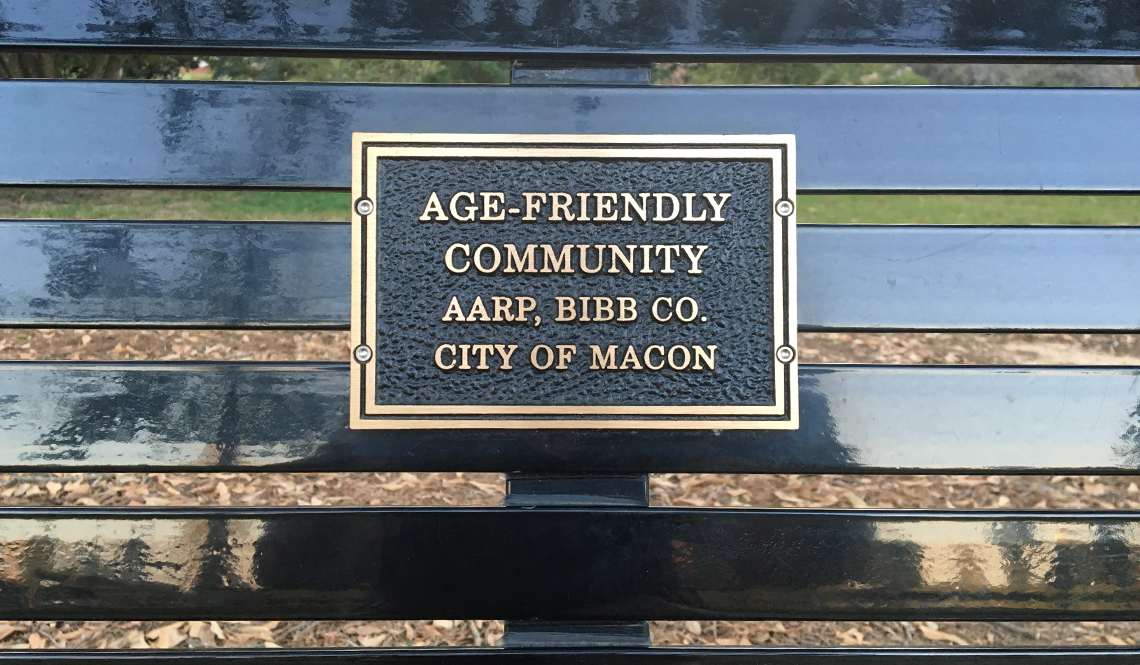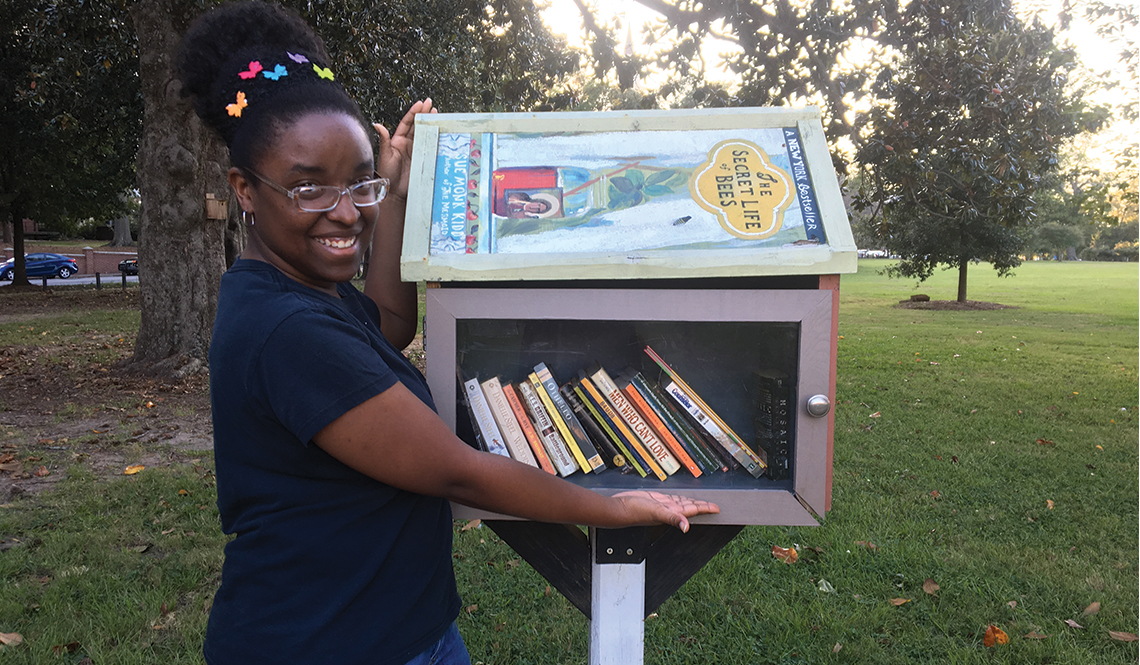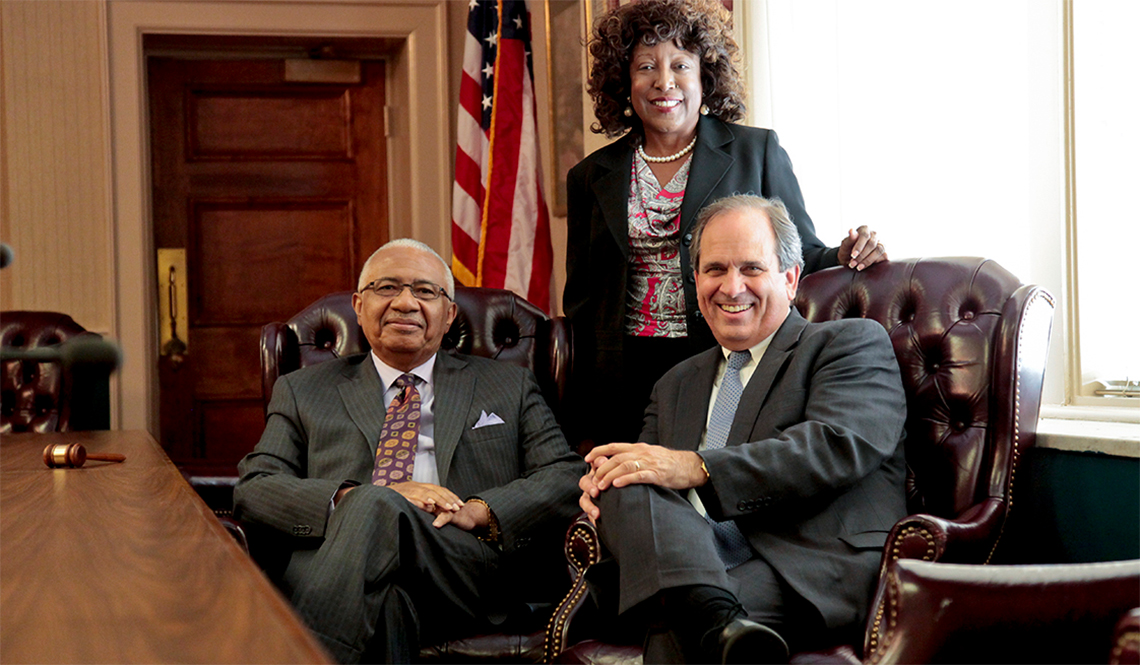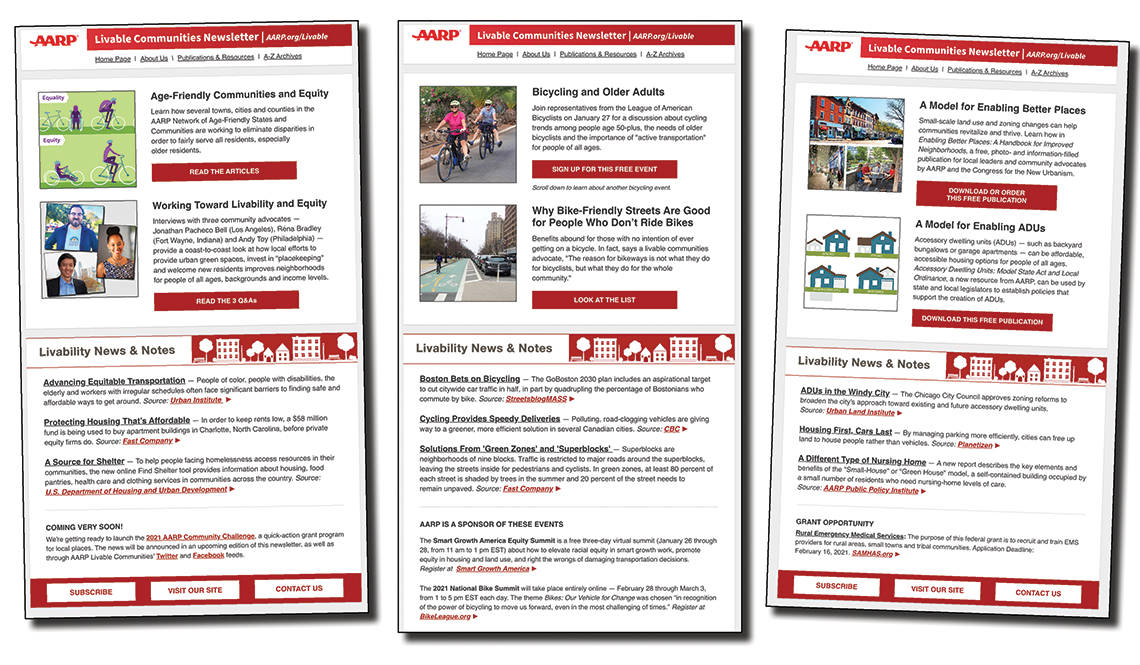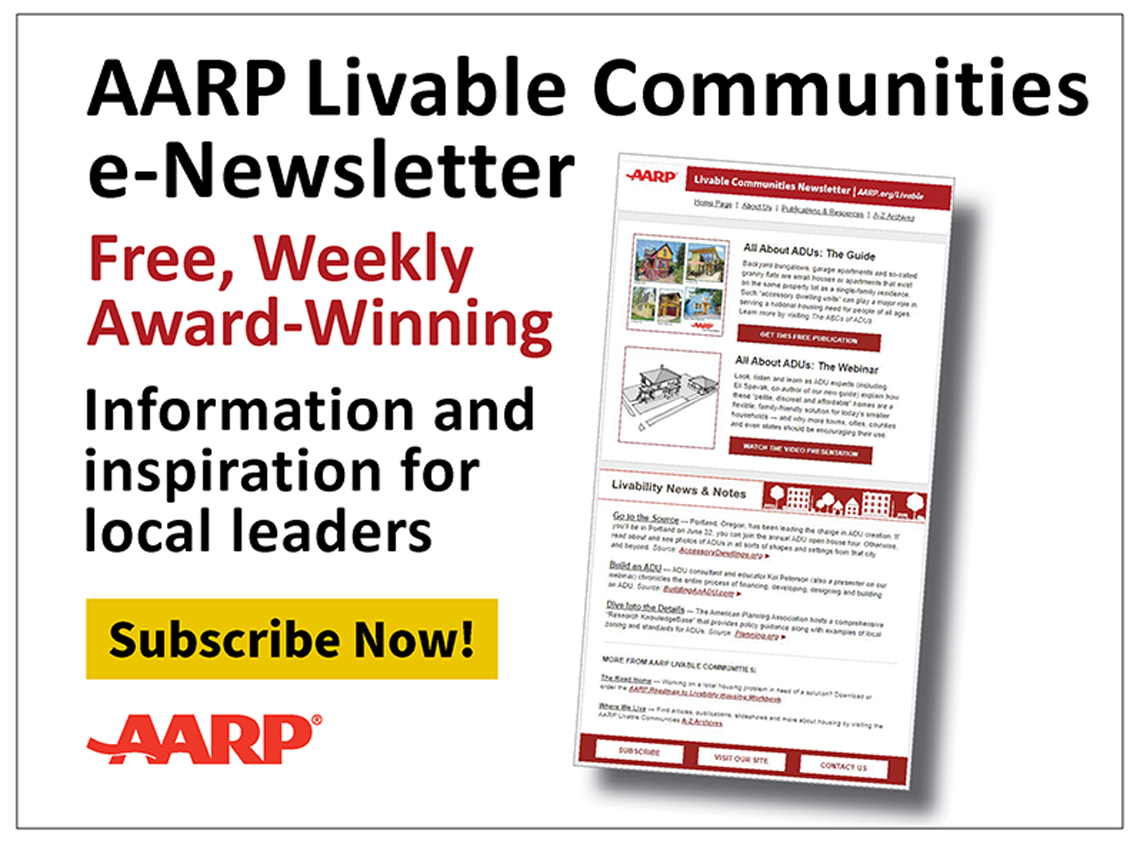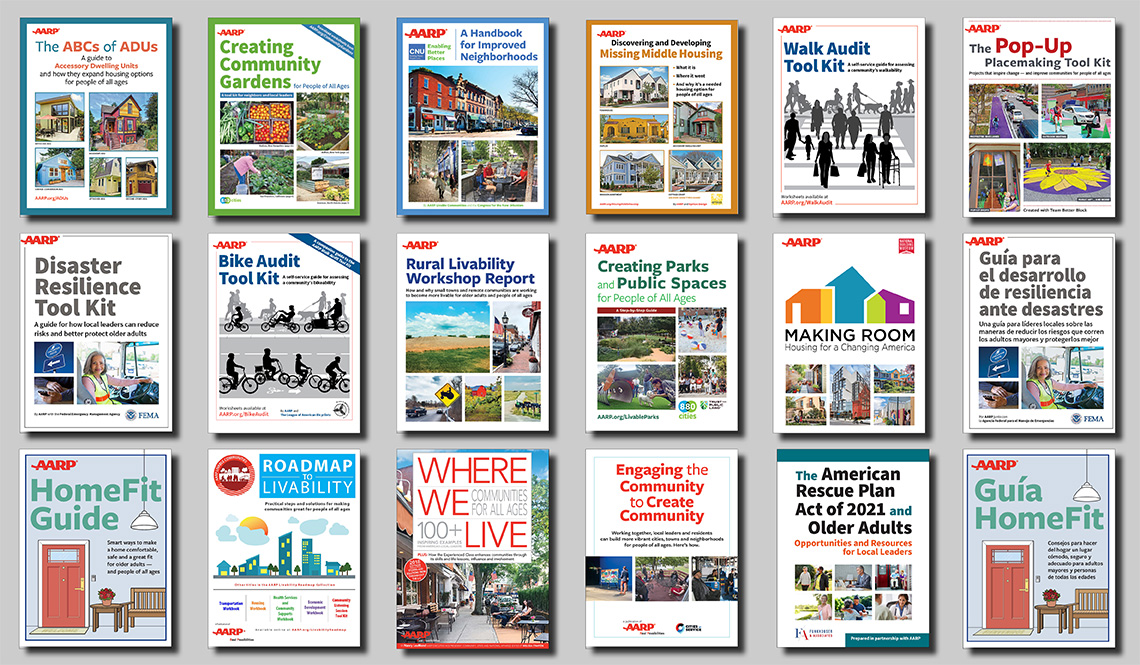Age-Friendly Greater Macon-Bibb, Georgia
A look at what the City of Macon and Bibb County have achieved since joining the AARP Network of Age-Friendly States and Communities
ACTIVITIES AS OF SEPTEMBER 2020
Member Profile
Located in central Georgia, an hour southeast of Atlanta, Macon-Bibb consists of an urban city center surrounded by largely rural neighborhoods. Nearly 15 percent of the area’s 153,000 residents are age 65 or older.
Initiative Name: Macon-Bibb, Georgia, Age-Friendly Community (Information about Macon-Bibb's age-friendly work and activities are integrated throughout the community's main website and social media platforms.)
Network Member Since: Macon-Bibb was the first community to join the AARP Network of Age-Friendly States and Communities, which debuted in April 2012 as the AARP Network of Age-Friendly Communities. Since residents in the city of Macon are also residents of Bibb County, the two local governments saw it as advantageous to partner in their efforts to become more age-friendly.
Community Partners
Government Type: In 2014, residents of the city and and residents of the county voted to consolidate their governments in order to save money and avoid replicating services. The community is led by a 10-member commission, with the mayor serving as its chair.
Reason(s) for Joining: “We thought it would be a mutually beneficial relationship. We felt membership could guide and direct us in building a community that would be friendly and attractive to people of all ages,” Mayor Robert Reichert told AARP in 2015. (Reichert was the mayor when Macon-Bibb joined the network. He was elected to his second term as mayor of the consolidated Macon-Bibb County government the following year but must leave office in 2020 due to term limits.)
“We were already in the process of trying to build a more walkable urban area and felt this would give us additional insight and benefit. Secondly, we felt it would be beneficial to work with AARP because Macon-Bibb already had strong initiatives in the works that could be fine-tuned to reflect some of the age-friendly goals and objectives. And perhaps most importantly, membership would be important to citizens and prospective citizens looking for a place to live and have an attractive quality of life.”
Local Leadership: Macon-Bibb’s age-friendly initiative was founded by:
- Robert Reichert, Mayor, Macon-Bibb, Georgia
- Sam Henderson, Senior Executive Assistant to the Mayor, Macon-Bibb
The Financials: The sources of funding vary, depending on the project, explains Reichert. For example, enhancements to Tattnall Square Park or Amerson Park involve a combination of government dollars, organizational support and private donations. The same is true for age-friendly pedestrian safety initiatives, which has been a joint effort of Bike Walk Macon, government planners, local law enforcement and community leaders. The new senior center was mostly financed with funds from the local SPLOST (Special Purpose Local Option Sales Tax). However, volunteers and community organizations contributed to refinements of the facility and its programs.
Getting Started: Macon-Bibb released its age-friendly plan (developed by a 28-member Community Advisory Council) in 2013.
Actions and Achievements
Age-Friendly Macon-Bibb has published its progress report for the years 2014 to 2016. Among the accomplishments thus far:
Making Public Parks Popular Again
Tattnall Square Park, which was established in the mid-19th century and, like Macon, fell into decline during the 1970s and 1980s, was dramatically transformed from a neglected 16-acre public park into a vital, destination location that’s used by more than 1,000 visitors a week.
Although the park’s revitalization was spearheaded by the local grassroots organization Friends of Tattnall Square Park, AARP Georgia, the city’s age-friendly work helped by conducting an audit of the surrounding community’s walkability and overall livability. The resulting report helped engage key players — including the local government — and provided recommendations for how to improve the park and the roads adjacent to it. (See the photo gallery "Literary Lessons in Tattnall Square Park" and the article "Restoring, Reinventing Tattnall Square Park" to learn more.)
Among the enhancements made soon after: ADA compliant gateways were created to help define the park’s boundaries and entrances; wider, smoother sidewalks were installed to better serve older pedestrians and people pushing strollers; benches, seating areas and a drinking fountain were added.
Drivers using the park as a shortcut and way to avoid traffic put pedestrians and other park users at risk, so community leaders made the park car-free and added traffic calming roundabouts outside of it, explains Myrtle Habersham, a Macon-Bibb resident and AARP Georgia lead volunteer. Another safety concern was the lack of sufficient lighting, so the volunteer organizations and local government installed lights and worked with the police to ensure adequate security coverage.
The park also received a recreational facelift. “The elementary school across from the park had no playground and Tattnall Square Park wasn’t user-friendly for children, so playground areas were installed,” Habersham adds.
Underused, ramshackle tennis courts were converted to pickleball courts, which are very popular with older adults. A new pavilion has become a sought-after spot for weddings. A large, historic but nonfunctioning centerpiece fountain has been renovated and now works. Added amenities include a farmers market, Art in the Park, Poetry in the Park, a dog park, movie screenings and free yoga on Saturdays — all of which attract residents of all ages.
Other parks also received age-friendly enhancements. Amerson River Park is popular with older residents due to its three miles of scenic walking trails. The park also contains Macon’s only fully-handicap-accessible playground. A federal grant of $5.5. million helped improve the park by adding picnic pavilions, a playground restroom and upgrades to riverfront areas where residents can fish and launch canoes.
In 2019, Amerson placed second among the more than two-dozen public parks from across the nation nominated for The Knope Award, which is presented by the organization Engaging Local Government Leaders and named for Leslie Knope, the main character on the popular sitcom Parks and Recreation.
Creating Needed Housing
One out of four Macon-Bibb County residents live at or below the poverty level. “Our senior population is increasing and because of our area having a high poverty rate, housing is at the top of our list of priorities,” says Habersham. "Since the development of our action plan, two affordable-housing apartment buildings for residents 62 or older with HUD income limits have been renovated.”
Local History, Local Lessons
In August 2020, a few months prior to the end of his final term as mayor, Robert Reichert spoke with AARP about why Macon-Bibb joined the AARP network — and why he'd advise other communities to do the same.
“We have a nonprofit here in Macon-Bibb County called NewTown Macon, which set about the task, in the late 1990s, of revitalizing downtown Macon, which had withered and dried up when the anchor stores moved from the downtown into the new Macon Mall in the mid-1970s.
“NewTown Macon had a three-part program to increase the number of downtown jobs, downtown residents, and create a unique sense of place in a walkable urban environment. Then, interestingly enough, here comes AARP with the age-friendly community framework and the 8 Domains of Livability. The County Commission chairman and I agreed that the program would be really good for Macon-Bibb County.
“Membership has done three things for Macon-Bibb: It further informed and educated us. It caused us to focus and refocus our thinking. And it inspired us to make additional efforts and include additional people in the work.
“We've done some great things as far as infrastructure and buildings are concerned. But I think there's a lot more that we could do in the Respect and Social Inclusion domain, especially in light of recent events with how the police interact with and treat black people. The need includes access to finances and business opportunities for people of color. As Macon-Bibb’s age-friendly work continues, I hope for refocused efforts and adding members to the steering committee for each domain.
“If another local leader asks me whether his or her community should join the AARP age-friendly network, I’d say definitely yes.
"Being part of the network has provided Macon-Bibb with information, assistance, programming and materials. It inspired us to work together to build a community in which we can grow old. If ever there was an example of enlightened self-interest, this has got to be one because we are all getting older. I see the attractiveness of a community that’s friendly to people of all ages. Macon-Bibb now has lot more programming and assistance directed toward older people. As I get older, I appreciate that more and more.”
In addition, the 75-year-old Tindall Heights was torn down and will be replaced with 72 affordable housing units and renamed Tindall Seniors Towers. The new housing is the first of four phases in the $45 million Tindall Heights redevelopment project. The master plans for Tindall Heights include a commercial complex aimed at providing jobs and shopping opportunities for the residents.
The second project is Hunt School Village, which is a redevelopment of an abandoned school property and will contain 36 one-bedroom and 24 two-bedroom units. Some units will be designed specifically for people with mobility, hearing or visual impairments. Shopping will be located nearby.
In 2019 Macon built five “tiny homes” through a partnership between the Bibb County government, the Georgia Department of Community Affairs and River Edge Behavioral Health. The tiny, 350 to 400 square foot homes are for people who are experiencing homelessness and have been diagnosed with a disability. River Edge provides the residents with case management services, such as employment and disability benefits.
“The director of residential housing in Macon is part of our age-friendly committee,” Habersham points out. “The residents of all these new housing complexes will need bus transportation. Key people, including the Macon Transit Authority president, are on our committee — and many report directly to the mayor! Their active participation on the Age Friendly Council is a plus and facilitates a more efficient process. It cuts out lots of red tape.”
A New Senior Center
In November 2018, the city celebrated the grand opening of the new Elaine H. Lucas Senior Center. The construction in Central City Park was funded by a voter-approved special purpose local option sales tax (SPLOST) and sale of the property where the former center was located. The project budget was $2.7 million and the new building has new features the community asked for, including a sewing room, dance room, kitchen and choir room.
Completing the Street
Nearing completion is the Second Street Corridor Project in the city of Macon, which will connect several different centers of economic activity into, as Mayor Reichert noted in his 2020 State of the Community Address, “a synergistic pattern, where the total economic activity produced will exceed the sum of the parts. That synergy will form the foundation for the vibrant urban core that will serve the Hub City of Middle Georgia!”
The work connects Second Street to Mercer University Boulevard and ultimately links I-75 to I-16 with a pedestrian-friendly, bicycle-friendly, retail-friendly Complete Street. Electric buses will ride along the corridor and the area will be walkable to city parks and the medical center. Added features include shade trees, landscaping, outdoor seating, continuous sidewalks and dedicated bike lanes.
"We think it’s going to greatly enhance downtown Macon by helping bring college students and the faculty and administration into the downtown," says Reichert. "Likewise, it helps to get downtown residents to the university for sporting events, lectures and educational opportunities. The Second Street Connector makes us a more walkable community."
Pedestrian Safety
Bike Walk Macon was founded in July 2015 with the support of the 8 80 Cities Emerging City Champions Fellowship program. Bike Walk Macon is a very strong community partner to the Age-Friendly Macon-Bibb Advisory team. Since 2016, Bike Walk Macon has worked to improve walkability and bikeability in Macon-Bibb County through several innovative, bold events and initiatives. The organization leveraged partnerships, volunteers and grant funds to build the world’s largest pop-up bike lane network, hosted four successful Open Streets programs and built Macon’s first green bike lane and artistic crosswalks.
Lessons Learned (and Advice for Others)
From Myrtle Habersham, a Macon-Bibb resident and AARP Georgia lead volunteer
Outreach is needed in advance of projects
“We’ve done a lot of pop-up demonstrations and did some temporary bike lanes,” Habersham notes. “People got a little irritated, because they didn’t know why bikes were in the street and why we were cutting into their driving space! What we learned is that we have to step up our outreach and educational efforts in advance to let the community know what we’re doing, why we’re doing it, especially since we still aren’t a big bicycling town. We ended up working with 880 Cities, which came in and did some workshops. We're proud Macon now has a model program that focuses on bicycling and walking as a convenient option for transportation and recreation.“
Age-Friendly Georgia
Visit AARP Georgia
Learn about the AARP Network of Age-Friendly States and Communities
Check out the network's Member List
Find commonalities
Perhaps the biggest lesson learned, says Habersham, is one that’s been applicable to many of the community projects she has been part of. “What we often found is that the initial and ongoing projects we were part of were already an action item for some other group or agency. So if we’re talking about having an event at Amerson River Park, the park belongs to the Macon-Bibb government, and they’ve already been given some kind of funding for that event. So we started to identify which of our action items are already on somebody else’s list and what kind of funding or support do they already have or need and then to go from there. By working through this type of decision-making process, it helped the council realize the importance of up-front coordination and communication.“
An ah-hah age-friendly moment
“It took us six to seven months to get comfortable with what we really meant when we were saying age-friendly livable community,” says Habersham. “We kept thinking, ‘This is another initiative you do when you finish your other initiatives.’ AARP helped us to realize this is what you’re already doing, while you are moving ahead on other assignments. You are consistently thinking about your residents, seeking their input and planning as to how you can be more accessible, and meet their needs."
Related Links
Reporting by Amy Lennard Goehner
Stay Informed
The weekly, award-winning AARP Livable Communities e-Newsletter provides local leaders with information and inspiration for making their town, city or neighborhood more livable for older adults and people of all ages. Subscribe today!
AARP.org/Livable
Enter a topic, name, place, etc.

